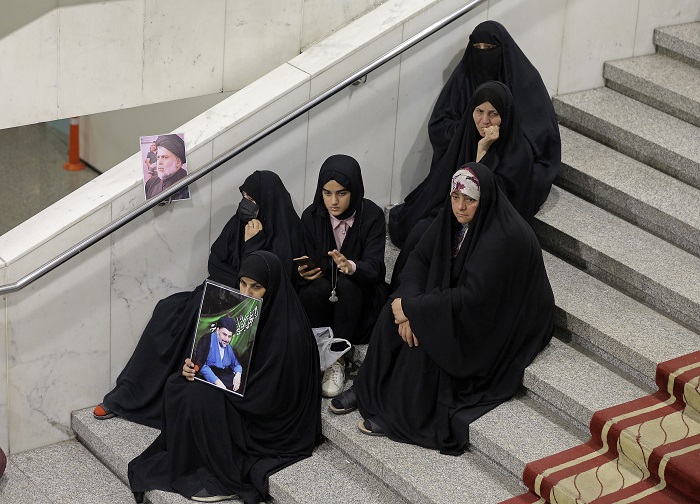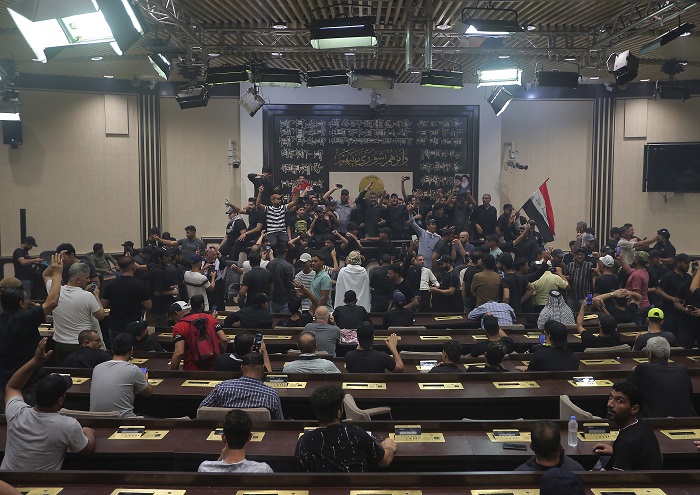world news online news
By Laure Al Khoury
A year since Iraq’s last elections, it remains without not only a new government but a budget too, obstructing much-needed reforms and infrastructure projects in the oil-rich but war-ravaged country. online news
Iraq has raked in huge revenues from oil exports this year, but the profits are locked up in the central bank’s coffers, which have amassed a colossal $87 billion in foreign exchange reserves.
The government can’t invest that money without an annual state budget — which Prime Minister Mustafa al-Kadhemi is not authorised to submit to parliament in his capacity as caretaker.
“Infrastructure projects require years of steady financial planning by government,” said Yesar al-Maleki, Gulf analyst at the Middle East Economic Survey (MEES).
“The political situation has caused a massive disruption that has further weakened Iraq’s poor standing with investors.”
Iraqis voted on October 10, 2021 in an early election triggered by a wave of protests that began two years earlier, condemning endemic corruption, rampant unemployment and decaying infrastructure.
The country has been mired in a seemingly impenetrable political deadlock since then, with rival Shiite factions in parliament vying for power and the right to select a new prime minister and government.
The impasse pits the powerful cleric Moqtada Sadr, who wants snap elections, against the Iran-backed Coordination Framework, which has been pushing to appoint a new head of government before any new polls are held.
- ‘Highly volatile’ –
Tensions boiled over on August 29, and more than 30 Sadr supporters were killed in clashes with Iran-backed factions and the army in Baghdad’s fortified Green Zone, which houses government buildings and diplomatic missions.
“The situation remains highly volatile,” the United Nations envoy to Iraq, Jeanine Hennis-Plasschaert, told the Security Council on Tuesday.
“Too many Iraqis have lost faith in the ability of Iraq’s political class to act in the interest of the country and its people.”
While the World Bank has offered projections of average annual growth of 5.4 percent between 2022 and 2024, it has also warned of the many challenges ahead.

“Further delays in government formation and in the ratification of the 2022 budget could restrict the use of the country’s revenue windfall from oil,” it said in a report issued in June, stressing that “new investment projects are put on hold”.
Without a budget for 2022, the government is bound by the provisions and rates set out in the 2021 budget, meaning public spending is extremely limited.
An emergency finance bill totalling 25 trillion Iraqi dinars (about $17 billion) was approved by parliament in June to ensure gas supplies and purchase grain for “food security”.
- ‘There’s money and gold’ –
But the ongoing deadlock hinders “the creation of opportunities for economic growth”, Mazhar Saleh, the prime minister’s financial adviser, told AFP.
world news online news
Still, some gas flaring projects launched by the oil ministry together with foreign companies are “moving at a slow pace”, economist Maleki said.
A $10-billion contract signed last year with French giant TotalEnergies is still in its early stages.
“The government is working to accelerate the work and remove obstacles” for the project, which includes processing facilities for flared gas and a solar power plant, said a source close to the project.
Former finance minister Ali Allawi, who had prepared a reform plan that never materialised, blamed the “political framework” for obstructing progress.
“The government’s plans and programmes were always constrained by the need to have broad agreement from a fractured political class,” said Allawi, who resigned in August.
Much of Iraq’s population of 42 million — a third of whom live in poverty, according to the United Nations — is left hanging.
Thousands of people took to the streets last week to mark three years since the October 2019 anti-government protests.
Amin Salman, who retired after a career in the army, had joined them. His two sons are unemployed and Salman, in his 60s, receives a monthly pension equivalent to $274.
“There are billions in Iraq. There’s money and there’s gold,” he said.
“But the politicians only worry about their own parties and their own pockets.”
lk/tgg/ami/jsa/srm/hc
© Agence France-Presse. All rights are reserved.
world news online news
Notes from APS Radio News
During the 2002 and in the period just before the US commenced its military invasion of Iraq in 2003, the Bush administration misled the public about Iraq’s having “weapons of mass destruction”.
Recently, Stella Moris, the spouse of Julian Assange, challenged John Bolton, one of neo-conservatives in the Bush Adminitration and the United States Ambassador to the UN in 2005 and 2006, during a recently held and televised interview.
Some later, when it was determined that its putative justification for engaging in military internvetion had dissipated, the administration turned to another justification.
It claimed that it was endeavoring to bring democracy to Iraq.
In the months and years after the invasion, sectarian conflict and violence increased.
A majority of Iraq’s population is Shiite, and a minority of the population is Sunni.
Iraq has spent years recovering from the invasion, in terms of replacing destroyed infrastructure.
According to the Iraq Body Count Project, there were between 185,000 to 208,000 casualties as a result of the US invasion.
A Lancet study concluded that over 90% of the deaths were due to violence.
The Costs of War, a project affiliated with Brown University, has itemized the costs associated with the wars in Iraq and in Afghanistan:
Over 801,000 people have died in the post-9/11 wars due to direct war violence, and several times as many due to the reverberating effects of war
Over 335,000 civilians have been killed as a result of the fighting.
37 million — the number of war refugees and displaced persons; according to Investigative Reporting Workshop, the total number of displaced persons could be as high as 80 million, between the Iraq & Afghanistan wars and other related wars since September 11, 2001.
The US federal price tag for the post-9/11 wars is over $6.4 trillion
The US government is conducting counterterror activities in 85 countries
The wars have been accompanied by violations of human rights and civil liberties, in the US and abroad.
In addition, the website makes mention of this fact: Since the commencement of these wars, there have been 30,177 suicides of veterans of these wars.
According to a number of economists, the expenditure of vast sums of money—trillions of dollars—on these wars has reduced substantially the purchasing power of the dollar.
world news online news
Observers have called inflation a “hidden tax”.
During the 1990’s the Clinton administration gave tacit if not explicit support to the Taliban government that took over the country during that time after over a decade of US and Soviet interventions in Afghanistan in the 1980’s.
During the late 1970’s then National Security Advisor Zbigniew Brzezinski oversaw surrpetitious intervention, which, in its turn, caused the secular government in Afghanistan to petition the Soviet Union to intervene.
According to the author Jean-Charles Brisard, in the summer of 2001, representatives of the Bush Administration and those of Unocal held a series of meetings with representatives of the Taliban government, for the purpose of obtaining rights of way for the emplacement & construction of a massive pipeline.
When the negotiations came to grief, Bush representatives threatened the Taliban with attacks against the country, Mr. Brisard described in his book, “Jean-Charles Brisard”.
Following the commencement of Soviet and US intervention in Afghanistan in the 1980’s, the country devloved into spheres of influnece dominated by various warlords.
The Pashtuns are the largest ethnic group in Afghanistan; they form a substantial precentage of the population on both sides of Afghanistan’s border with Pakistan.
The Taliban are comprised of members of the Pashtuns, which are the largest ethnic group in Afghanistan.
During the 1960’s and 1970’s, compared to the the 1990’s and beyond, Afghanistan had governments that were deemed more secular.
During that time women attended schools and were more likely to wear Western type clothing.
As a result of actions and policies implemented National Security advisor, Zbigniew Brzezinski, during the Carter administration, the government in Afghanistan in the late 1970’s requested Soviet assistance.
After the Soviet armed forces had entered Afghanistan, the CIA funded and armed groups like the Mujahideen and other militant Islamists.
world news online news


